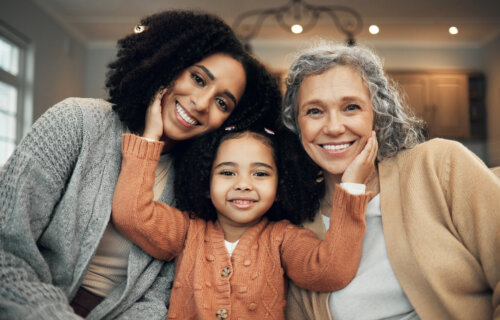HELSINKI, Finland — Having a grandparent nearby to lend a hand or come over in a pinch can make a world of difference for mothers, according to new research out of Finland. Scientists have found that moms are less likely to take antidepressants if either their own parents or their partner’s parents are healthy and live close by. Conversely, the use of antidepressants was highest among mothers with grandparents or in-laws who are elderly, in poor health, and live far away.
Study authors theorize that mothers with distant or unhealthy grandparents may use more antidepressants due to the extra stress they deal with by having to care for their family members as opposed to receiving support from them. This study included and tracked 488,000 mothers raising young children between 2000 and 2014.
“Previous studies have consistently shown that younger grandparents in good health are more likely to provide support and childcare,” says Niina Metsä-Simola, co-author of the study and demographics researcher at the University of Helsinki, in a media release. “Whereas having an old and frail grandparent may even place an additional burden on mothers, as they cannot expect to receive support from such grandparents but instead need to continue providing support upwards.”
Among the mothers studied in Finland, the effect was strongest for women who had separated from their partners during the tracking period.
“This makes sense,” Metsä-Simola suggests, “as separated mothers often take on primary physical custody of their child, and may often need to rely on relatives to cope with the challenges of single motherhood.”
“Mothers in such a situation may need to take on additional work, affecting their need for childcare, and may even need to move home. Having practical and emotional support at such a time would be invaluable,” the researcher continues. “Parents of young children, especially those entering single parenthood, may be especially vulnerable to the adverse mental health effects of separation.”
“This could explain why, in our study, grandparental support was particularly relevant for the mental health of separating mothers.”
💡How Do Antidepressants Work?
- They affect brain chemicals called neurotransmitters, particularly serotonin and norepinephrine.
- Many antidepressants increase the availability of these neurotransmitters by slowing their absorption or mimicking their effects.
- They impact specific brain circuits involved in mood regulation.
- These circuits connect different brain regions and influence how information is processed.

Researchers stress that the fact this study was held in Finland, a nation with an extensive history of pro-egalitarian policies, is very relevant. In Finland and other Nordic countries, mothers enjoy universal access to health and social services, in addition to affordable early childhood care and education.
Low-cost housing with care is also provided for older individuals. Despite all of these generous policies, a link still appeared between grandparents’ closeness, age, and health and mothers’ antidepressant use. It is unknown if the link is stronger in less egalitarian countries such as the United Kingdom.
“Our study suggests that support exchanges across generations matter for mothers’ mental health, even in the context of a Nordic welfare state where all parents—including single parents—benefit from generous institutional support,” Metsä-Simola comments. “Even in the pro-egalitarian context of Finland, potential availability of grandparental support matters for maternal mental health, especially among the vulnerable population subgroup of separating mothers.”
While the research team was able to successfully measure numerous characteristics related to both maternal and paternal grandparents, this project was limited by the utilized dataset containing no direct measure of support exchanges between mothers and grandparents. In other words, study authors couldn’t actually observe how often grandparents provided childcare or how involved they were in the lives of their children and grandchildren.
Moving forward, researchers recommend future studies adopt a “broader perspective” by assessing if the depression trajectories of separating/divorcing childless women are in any way moderated by the characteristics of their own parents and ex-parents-in-law. While these women may not receive childcare help, they may still benefit from other types of support.
Additionally, study authors suggest future projects analyze how women’s other characteristics, such as relationship and fertility behaviors, help determine the association between their parents’ characteristics and their own mental health.
The study is published in the journal Population Studies.
You might also be interested in:
- Philosophy Prof: Is It Reasonable To Bring Children Into Today’s World?
- Exercise Or Antidepressants? Study Finds Running Just As Effective For Treating Depression
- Some antidepressants do nothing at all for patients dealing with chronic pain, study reveals
- Mighty moms: 3 in 4 millennial mothers are hiding their stress from their families
- Family tree stumped: Most Americans can’t name all 4 of their grandparents!
